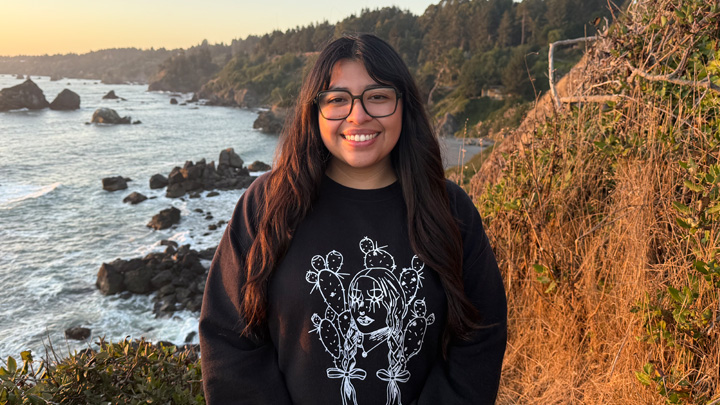STUDENT SPOTLIGHT: Anayeli Auza

When San Diegan Anayeli Auza found herself on the other end of California for her undergraduate studies, she was almost overwhelmed by the culture shock and loneliness she experienced. What she knew from the busy and culturally rich city life back home could not be found in the small and culturally homogenous town of Arcata.
But after Auza completed her undergraduate degree and teaching credential program at California State Polytechnic University, Humboldt, she decided to stay and become a teacher at Arcata High School.
“It was really important for me to find my allies to just understand,” Auza said. “Even though I may be alone in my experience, there are people who are willing to support me.”
In doing so, she’s found a passion for creating and fostering welcoming communities to benefit all students.
Now, as a master’s student in San Diego State University’s Department of Dual Language and English Learner Education, she hopes to incorporate democratic schooling into both her classroom and school — and eventually, hopefully, the district and beyond. Auza chose the DLE program because it was the only one she found that really connected her passion for social justice and education and the experience has been great so far.
“I’m just really excited to be a student again,” Auza said. “I’m really excited to just learn from the professors who have more experience and have more knowledge in these topics and take that with me to spread that knowledge.
“I want to learn how I can continue advocating for myself as an educator, but also advocate for my students and then teach them how to advocate for themselves.”
Connecting with students
Before Auza joined the DLE program, she had already had a passion for multilingual education.
During Auza’s time as an undergraduate at Cal Poly Humboldt, her heavy interest and involvement in social justice activism, particularly immigrant rights, led her to join the Promotorx Transformative Educators program. Through the experience, she learned how to incorporate culturally-sustaining pedagogies and counter-narratives to build educational experiences that are driven by her personal and cultural strengths.
The professor who facilitates the program encouraged Auza to apply for a credential program to further expose her to multicultural education and the flaws within that system that need to be addressed. That led Auza to her current calling as a Spanish and ethnic studies teacher.
Drawing on her own past feelings of isolation, Auza makes it a priority to be an educator who builds a safe and personal space for students to feel welcomed and celebrated to fully express themselves.
“I promised myself that I would try to make my lessons engaging and also build connections with the students,” Auza said. “One of my biggest approaches is building those relationships with students and really getting to know them, so that I can make lessons or bring up topics about things that they like. It’s very personal with their learning.”
Auza said she makes sure to recognize her high schoolers’ unique talents and wants to support them in ways that push them to reach their potential.
In Auza’s ethnic studies classes, she empowers her students to be unafraid of difficult conversations on topics such as discrimination and colorism. Being able to facilitate discussions in a healthy way is impactful. Auza notes her students are eager to not just learn and understand things about themselves, but also their classmates sitting next to them, creating bonding moments.
Historically, and in her own experience as a multilingual learner, Auza knows that bilingual learners have long been overlooked. In communities such as Arcata, the growing demographic of students in ELD programs is something new for school districts and the systems that they have in place. She adds that students can end up falling through the cracks as their intelligence is measured solely by how well they grasp English.
“Being multilingual is such an amazing skill and ability to have,” Auza asserts. “Just because we can’t communicate with you doesn’t mean that we’re any less, or that we know any less than. I just wish people would humanize everybody and truly be willing to understand their struggles, because then we would realize that we’re actually more connected.”
At the end of her SDSU program, Auza hopes she can make an even bigger difference.
Whether she stays in the classroom or finds herself shaping educational policy on her journey in education, she hopes to inspire students to continue pursuing whatever it is that they want to do and continue advocating for that right for themselves and each other.
“It’s really important to find your people,” Auza said, “especially when you feel like you don’t belong.”

